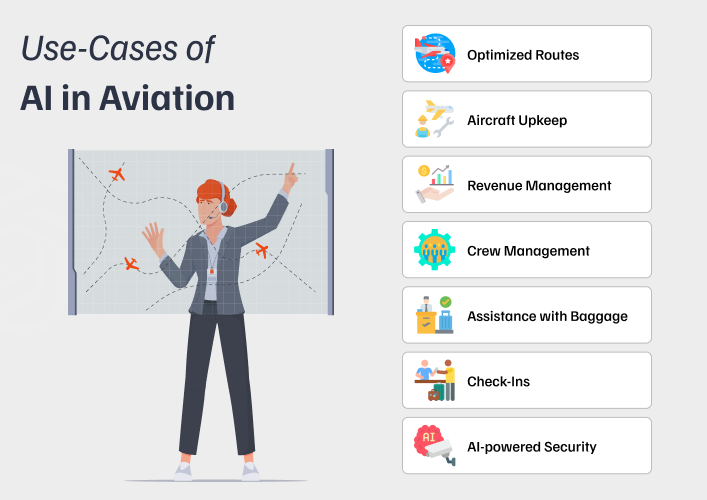Use-Cases of AI in Aviation

The use of AI and its cognitive tools that interpret data may expedite and automate a wide range of internal tasks and processes. This includes analytics, upkeep of machines, customer service, and many more. Consequently, AI in aviation can help with a number of aspects of controlling aircraft operations. In order to create an extensible aviation program that overcomes all industry problems, stakeholders are increasingly engaging with premium aviation software development companies. Let’s learn the most popular uses of AI in aviation industry:
Optimized Routes
Many long-haul flights land in a mid-range location, where passengers frequently have to go through official security checks in order to check in to another aircraft. This is referred to as a stopover in formal language. From the perspective of the traveler, the procedure is very uncomfortable, necessitates interpersonal interaction, and always raises the possibility of community transmission.
Thus, rerouting and optimizing lengthy flights is one of AI’s benefits for the aviation sector. AI can suggest the quickest routes for transit when airlines are at capacity, conserving fuel and other resources that need a large initial investment.
Aircraft Upkeep
Airlines have a significant financial burden as a result of cancellations and delays, which includes paying for maintenance and compensating customers who become stuck in airports. Unplanned maintenance accounts for about 30% of total delay time. Thus, predictive maintenance may save an airline money on unscheduled repairs and overtime compensation for employees.
Revenue Management
It is essential to have a unified aviation technology for efficient revenue management and improvement of aviation operations. Revenue management is the process of defining how to sell a product to people who need it, at the right price, at the right time, and through the right channel using data and analytics.
A revenue management system assists in analyzing how different customers perceive the worth of a product and how much they are prepared to pay for it depending on when they make their purchase and which target market they belong to.
Revenue management experts can utilize AI in aviation effectively to discover destinations, adjust pricing for certain markets, and determine the most efficient distribution channels in order to keep the airline both affordable and customer-friendly.
Crew Management
Experts consider a range of factors when creating conflict-free schedules for pilots and flight attendants, including the flight path, crew member qualification and licensing, kind of plane and fuel consumption, work regulations, vacation time, and days off. Government regulations, aircraft maintenance schedules, and training needs such as partnering experienced members of the crew with junior ones must also be taken into account. Thus, implementing AI in aviation can help in managing crew scheduling.
Assistance with Baggage
By integrating AI-powered tracking systems and RFID tags, the likelihood of both contact tracing and improper handling of luggage may be reduced. Furthermore, not everyone would see the security in entrusting an unidentified driver to remove pricey things and obediently drop them off at airports. Therefore, self-drop luggage lanes might be a lifesaver for individuals who are determined to handle tasks alone.
They not only decrease reliance on humans but also expedite the handling of luggage. In these lanes, robots equipped with AI-powered face recognition software might be used to identify the property’s legitimate owner.
Check-Ins
If you can generate the courage to board an aircraft, make sure you have all the information you need, including boarding card details, baggage claim information, weather reports, and flight status. Currently, in order to obtain each piece of information, passengers must switch between numerous applications. Prominent travel app development businesses are searching for methods to use AI to revitalize the aviation sector.
AI-powered Security
Security checks are among the most time-consuming and annoying parts of boarding an airline. In order for passengers’ belongings to be properly inspected, wearables and empty purses must be removed at all major airports. I think we can all agree that the procedure is really unpleasant. Not to add that when authorities rigorously scrutinize travelers, the rigid distances that must be kept are broken.
When AI in the aviation safety sector starts to show promise, all of this will become obsolete. Airports would see the introduction of cutting-edge scanners with features like 3D image processing, anomaly prevention systems, and/or X-ray mapping.
Conclusion
The influence of AI in the aviation industry has been transforming various aspects of operations, safety, and passenger experience. From enhancing flight navigation systems to optimizing maintenance procedures, AI has significantly contributed to the efficiency and reliability of air travel. The integration of machine learning algorithms has enabled airlines and aviation companies to make data-driven decisions, leading to improved safety measures, cost-effectiveness, and overall performance.
The use of AI in predictive maintenance has played a crucial role in preventing equipment failures and reducing downtime, ensuring that aircraft remain in optimal condition. Flight planning and route optimization have also benefited from AI, resulting in fuel savings, reduced emissions, and improved on-time performance.
FAQs
How does AI improve aviation safety?
Can AI improve the efficiency of airline operations?
What role does AI play in passenger services?
Are there challenges associated with the integration of AI in aviation?
How is the aviation industry addressing the ethical implications of AI?
Shivangi is a passionate Copywriter at Alian Software with expertise in technical copywriting. She shares information that is easy to understand regarding business, technology, and trends.